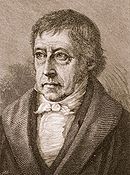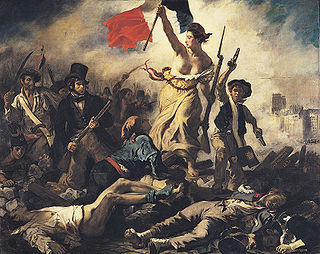- Master-slave dialectic
-
This article is about Hegel's master-slave dialectic. For the general terms, see Master (disambiguation) and Slave. For computer controllers, see Master-slave (technology).

Part of a series on G. W. F. Hegel People Immanuel Kant
Johann Wolfgang von Goethe
Johann Gottlieb Fichte
Friedrich Hölderlin
Friedrich Schelling
Arthur Schopenhauer
Søren Kierkegaard
Baruch SpinozaWorks Phenomenology of Spirit
Science of Logic
Encyclopedia
Philosophy of Right
Philosophy of HistorySchools Hegelianism
Absolute idealism
British / German idealism
Dialectic
Master-slave dialecticRelated topics Right Hegelians
Young Hegelians
Marx's theory of alienation
The Secret of HegelThe Master-Slave dialectic (Herrschaft und Knechtschaft in German; also translated Lordship and Bondage) is a famous passage of Hegel's Phenomenology of Spirit. It is widely considered a key element in Hegel's philosophical system, and has heavily influenced many subsequent philosophers. It describes, in narrative form, the encounter between two self-conscious beings, who engage in a "struggle to the death" before one enslaves the other, only to find that this does not give him the control over the world he had sought.
Contents
Context
"Independent and Dependent Self-Consciousness: Lordship and Bondage" is the first of two titled subsections in the "Self-Consciousness" chapter of the Phenomenology. It is preceded in the chapter by a discussion of "Life" and "Desire," among other things, and is followed by "Free Self-Consciousness: Stoicism, Skepticism, and the Unhappy Consciousness."
It is a story or myth created by Hegel in order to explain his idea of how self-consciousness dialectically sublates into what he variously refers to as Absolute Knowledge, Spirit, and Science. The Phenomenology exists, for reasons that are part of its nature and place in Hegel's work, in two places - as an independent work, apparently considered by Hegel to be an a priori for understanding the Science of Logic, and as a part of the Science of Logic, where absolute knowledge is explained.
Recognition
Crucially, for Hegel, absolute knowledge, or Spirit, cannot come to be without first a self consciousness recognizing another self-consciousness. Such an issue in the history of philosophy had never been explored (except by Johann Gottlieb Fichte) and its treatment marks a watershed in European philosophy.
Hegel's myth
In order to explain how this works, Hegel uses a story that is in essence an abstracted, idealized history about how two people meet. However, Hegel's idea of the development of self-consciousness from consciousness, and its sublation into a higher unity in absolute knowledge, is not the contoured brain of natural science and evolutionary biology, but a phenomenological construct with a history; one that must have passed through a struggle for freedom before realizing itself.
The abstract language used by Hegel never allows one to interpret this story in a straightforward fashion. It can be read as self-consciousness coming to itself through a child's or adult's development, or self-consciousness coming to be in the beginning of human history (see hominization) or as that of a society or nation realizing freedom.
That the master-slave dialectic can be interpreted as an internal process occurring in one person or as an external process between two or more people is a result, in part, of the fact that Hegel asserts an "end to the antithesis of subject and object". What occurs in the human mind also occurs outside of it. The objective and subjective, according to Hegel, sublate one another until they are unified, and the "story" takes this process through its various "moments" when the lifting up of two contradictory moments results in a higher unity.
First, the two abstract consciousnesses meet and are astounded at the realization of the self as a foreign object. Each can choose to ignore the other, in which case no self-consciousness forms and each views the other merely as an animated object rather than an equivalent subject. Or, they become mesmerized by the mirror-like other and attempt, as they previously had done in controlling their own body, to assert their will.
According to Hegel,
- "On approaching the other it has lost its own self, since it finds itself as another being; secondly, it has thereby sublated that other, for this primitive consciousness does not regard the other as essentially real but sees its own self in the other."[1]
Reaction
The "I" sees another "I" and finds its own pre-eminence and control compromised. It ignores this other or sees it as a threat to itself. Its own self-certainty and truth have forevermore been shattered. The only means of re-asserting itself, in order to proceed toward self-consciousness, is by entering into a struggle for pre-eminence.
Death struggle
A struggle to the death ensues. However, if one of the two should die, the achievement of self-consciousness fails. Hegel refers to this failure as "abstract negation" not the negation or sublation required. This death is avoided by the agreement, communication of, or subordination to, slavery. In this struggle the Master emerges as Master because he doesn't fear death as much as the slave, and the slave out of this fear consents to the slavery. This experience of fear on the part of the slave is crucial, however, in a later moment of the dialectic, where it becomes the prerequisite experience for the slave's further development.
Enslavement and mastery
Truth of oneself as self-conscious is achieved only if both live; the recognition of the other gives each of them the objective truth and self-certainty required for self-consciousness. Thus, the two enter into the relation of master/slave and preserve the recognition of each other.
Contradiction and Resolution
However, this state is not a happy one and does not achieve full self-consciousness. The recognition by the slave is merely on pain of death. The master's self-consciousness is dependent on the slave for recognition and also has a mediated relation with nature: the slave works with nature and begins to shape it into products for the master. As the slave creates more and more products with greater and greater sophistication through his own creativity, he begins to see himself reflected in the products he created, he realizes that the world around him was created by his own hands, thus the slave is no longer alienated from his own labour and achieves self-consciousness, while the master on the other hand has become wholly dependent on the products created by his slave; thus the master is enslaved by the labour of his slave. The realization of this contradiction allow the slave to once again struggle against his master. The contradiction is resolved when the difference between slave and the master is dissolved and both persons recognize that they are equal.
Conclusions
One interpretation of this dialectic is that neither a slave nor a master can be considered as fully self-conscious. A person who has already achieved self-consciousness could be enslaved, so self-consciousness must be considered not as an individual achievement, or an achievement of natural and genetic evolution, but as a social phenomenon.[2]
As philosopher Robert Brandom explains, "Hegel's discussion of the dialectic of the Master and Slave is an attempt to show that asymmetric recognitive relations are metaphysically defective, that the norms they institute aren't the right kind to help us think and act with--to make it possible for us to think and act. Asymmetric recognition in this way is authority without responsibility, on the side of the Master, and responsibility without authority, on the side of the Slave. And Hegel's argument is that unless authority and responsibility are commensurate and reciprocal, no actual normative statuses are instituted. This is one of his most important and certainly one of his deepest ideas, though it's not so easy to see just how the argument works." [3]
Kojeve's unique interpretation differs from this. For Kojeve, people are born and history began with the first struggle, which ended with the first masters and slaves. A person is always either master or slave; and there are no real humans where there are no masters and slaves. History comes to an end when the difference between master and slave ends, when the master ceases to be master because there are no more slaves and the slave ceases to be a slave because there are no more masters. A synthesis takes place between master and slave: the integral citizen of the universal and homogenous state created by Napoleon.[4]
Influence of the master-slave dialectic
The master and slave relationship influenced numerous discussions and ideas in the 20th century, especially because of its supposed connection to Karl Marx's conception of class struggle as the motive force of social development, although Chris Arthur has argued that this connection was falsely instigated by Sartre under the influence of French philosopher Alexandre Kojève.[5]
Hegel's master-slave dialectic has had an unacknowledged influence upon Friedrich Nietzsche's ideas about Master Morality and Slave Morality (See Master-slave morality.[6]) It has also been influential in the social sciences and in psychoanalysis.[7] Furthermore, Hegel's master-slave trope, and particularly the emphasis on recognition, has been of crucial influence on Martin Buber's relational schema in I and Thou, Simone de Beauvoir's account of the history and dynamics of gender relations in The Second Sex and Frantz Fanon's description of the colonial relation in Black Skin, White Masks.[8] Susan Buck-Morss's article 'Hegel and Haiti'[9] considers how the Haitian revolution greatly influenced Hegel's writing of his slave-master dialect.
Kojève argued that Hegel's intentions were to illustrate that overcoming the fear of death was the only way to achieve true freedom. This was not actually stated by Hegel (in truth at points in this work he makes a direct argument against the use of force as the manner in which history develops). A recent work that uses this argument is Francis Fukuyama's The End of History and the Last Man. Fukuyama admits in the work that his understanding of Hegel is mostly Kojèvian, in particular his conception of the end of history as an ultimate stage of history, while it is, according to Georg Lukács' interpretation, not a transcendent end but an aim immanent to the never-ending process.
See also
- Philosophy of history
- Hegelianism and Young Hegelians
- Master-slave morality (Friedrich Nietzsche)
- Discourse of the Master (Jacques Lacan)
Notes
- ^ G.W.F. Hegel, Phenomenology of Spirit, translated by A.V. Miller with analysis of the text and foreword by J. N. Findlay (Oxford: Clarendon Press, 1977)Paragraph 179 Pg. 111.
- ^ Philip Moran, Hegel and the Fundamental Problems of Philosophy, Holland: Grüner, 1988.
- ^ Robert Brandom, Interview, Summer 2008. Video: http://video.google.com/videoplay?docid=-1034802594689246468. 15m:25s.
- ^ Alexandre Kojève, Introduction à la lecture de Hegel, France: Gallimard, 1947. Translated as Introduction to the Reading of Hegel, New York: Basic Books, 1969.
- ^ Chris Arthur, "Hegel’s Master-Slave Dialectic and a Myth of Marxology." New Left Review I/142, November–December 1983
- ^ Friedrich Nietzsche, On The Genealogy of Morals, New York: Vintage, 1989.
- ^ Julia Borossa and Caroline Rooney, "Suffering, Transience and Immortal Longings: Salomé Between Nietzsche and Freud," Journal of European Studies 33(3/4): 287–304 London, 2003.
- ^ Frantz Fanon, Black Skin, White Masks, New York: Grove Press, 1967: 62.
- ^ Susan Buck-Morss, Hegel and Haiti, Critical Inquiry, Vol. 26, No. 4. (Summer, 2000), pp. 821-865.
Categories:- Georg Wilhelm Friedrich Hegel
- Philosophical concepts
- Political philosophy
Wikimedia Foundation. 2010.

